Fleurs du Mal Magazine


Or see the index
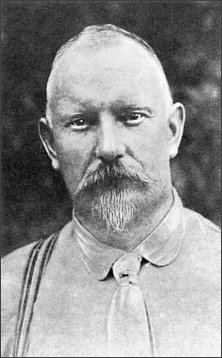
Jules Renard
(1864-1910)
Ne réservez pas à ma vieillesse un château
… Ne réservez pas à ma vieillesse un château, mais faites-
moi la grâce de me garder, comme dernier refuge, cette cuisine
avec sa marmite toujours en l’air,
avec la crémaillère aux dents diaboliques,
la lanterne d’écurie et le moulin à café,
le litre de pétrole, la boîte de chicorée extra et les allumettes
de contrebande,
avec la lune en papier jaune qui bouche le trou du tuyau de poêle,
et les coquilles d’oeufs dans la cendre,
et les chenets au front luisant, au nez aplati,
et le soufflet qui écarte ses jambes raides et dont le ventre fait
de gros plis,
avec ce chien à droite et ce chat à gauche de la cheminée,
tous deux vivants peut-être,
et le fourneau d’où filent des étoiles de braise,
et la porte au coin rongé par les souris,
et la passoire grêlée, la bouillotte bavarde et le grill haut sur
pattes comme un basset,
et le carreau cassé de l’unique fenêtre dont la vue se paierait cher
à Paris,
et ces pavés de savon,
et cette chaise de paille honnêtement percée,
et ce balai inusable d’un côté,
et cette demi-douzaine de fers à repasser, à genoux sur leur planche,
par rang de taille, comme des religieuses qui prient, voilées de noir
et les mains jointes.
jules renard poésie
fleursdumal.nl magazine
More in: Archive Q-R, CLASSIC POETRY
 The Sorrows of Young Werther (22) by J.W. von Goethe ♦ JULY 20. I cannot assent to your proposal that I should accompany the ambassador to ——. I do not love subordination; and we all know that he is a rough, disagreeable person to be connected with. You say my mother wishes me to be employed. I could not help laughing at that. Am I not sufficiently employed? And is it not in reality the same, whether I shell peas or count lentils? The world runs on from one folly to another; and the man who, solely from regard to the opinion of others, and without any wish or necessity of his own, toils after gold, honour, or any other phantom, is no better than a fool.
The Sorrows of Young Werther (22) by J.W. von Goethe ♦ JULY 20. I cannot assent to your proposal that I should accompany the ambassador to ——. I do not love subordination; and we all know that he is a rough, disagreeable person to be connected with. You say my mother wishes me to be employed. I could not help laughing at that. Am I not sufficiently employed? And is it not in reality the same, whether I shell peas or count lentils? The world runs on from one folly to another; and the man who, solely from regard to the opinion of others, and without any wish or necessity of his own, toils after gold, honour, or any other phantom, is no better than a fool.
JULY 24. You insist so much on my not neglecting my drawing, that it would be as well for me to say nothing as to confess how little I have lately done.
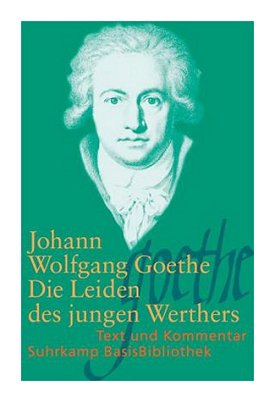 I never felt happier, I never understood nature better, even down to the veriest stem or smallest blade of grass; and yet I am unable to express myself: my powers of execution are so weak, everything seems to swim and float before me, so that I cannot make a clear, bold outline. But I fancy I should succeed better if I had some clay or wax to model. I shall try, if this state of mind continues much longer, and will take to modelling, if I only knead dough.
I never felt happier, I never understood nature better, even down to the veriest stem or smallest blade of grass; and yet I am unable to express myself: my powers of execution are so weak, everything seems to swim and float before me, so that I cannot make a clear, bold outline. But I fancy I should succeed better if I had some clay or wax to model. I shall try, if this state of mind continues much longer, and will take to modelling, if I only knead dough.
I have commenced Charlotte’s portrait three times, and have as often disgraced myself. This is the more annoying, as I was formerly very happy in taking likenesses. I have since sketched her profile, and must content myself with that.
The Sorrows of Young Werther (Die Leiden des jungen Werther) by J.W. von Goethe. Translated by R.D. Boylan.
To be continued
fleursdumal.nl magazine for art & literature
More in: -Die Leiden des jungen Werther, Goethe, Johann Wolfgang von
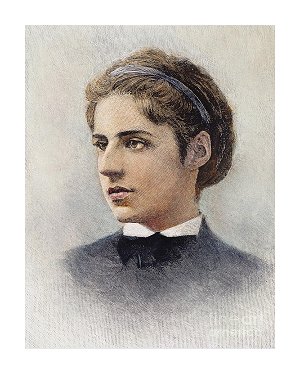
Emma Lazarus
(1849 – 1887)
Youth
Sweet empty sky of June without a stain,
Faint, gray-blue dewy mists on far-off hills,
Warm, yellow sunlight flooding mead and plain,
That each dark copse and hollow overfills;
The rippling laugh of unseen, rain-fed rills,
Weeds delicate-flowered, white and pink and gold,
A murmur and a singing manifold.
The gray, austere old earth renews her youth
With dew-lines, sunshine, gossamer, and haze.
How still she lies and dreams, and veils the truth,
While all is fresh as in the early days!
What simple things be these the soul to raise
To bounding joy, and make young pulses beat,
With nameless pleasure finding life so sweet.
On such a golden morning forth there floats,
Between the soft earth and the softer sky,
In the warm air adust with glistening motes,
The mystic winged and flickering butterfly,
A human soul, that hovers giddily
Among the gardens of earth’s paradise,
Nor dreams of fairer fields or loftier skies.
Emma Lazarus poetry
fleursdumal.nl magazine
More in: Archive K-L, Lazarus, Emma
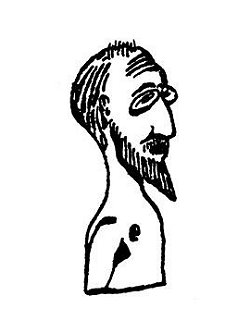
Erik Satie
(1866 – 1925)
Le Tango
Le tango est la danse du diable.
C’est celle qu’il préfère.
Il la danse pour se refroidir.
Sa femme, ses filles et ses domestiques se refroidissent.
5 mai 1914
Erik Satie Le Tango
fleursdumal.nl magazine
More in: Archive S-T, DANCE & PERFORMANCE, Erik Satie, Satie, Erik
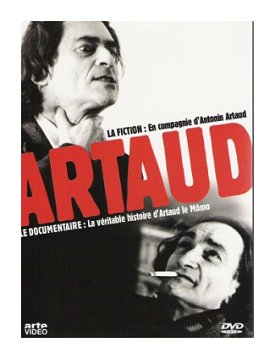 Van Gogh / Artaud. The Man Suicided by Society ♦ A few days before the opening of a van Gogh exhibition in Paris in 1947, gallery owner Pierre Loeb suggested that Antonin Artaud (1896-1948) write about the painter. Challenging the thesis of alienation, Artaud was determined to show how van Gogh’s exceptional lucidity made lesser minds uncomfortable.
Van Gogh / Artaud. The Man Suicided by Society ♦ A few days before the opening of a van Gogh exhibition in Paris in 1947, gallery owner Pierre Loeb suggested that Antonin Artaud (1896-1948) write about the painter. Challenging the thesis of alienation, Artaud was determined to show how van Gogh’s exceptional lucidity made lesser minds uncomfortable.
Wishing to prevent him from uttering certain “intolerable truths”, those who were disturbed by his painting drove him to suicide.
Based on the categories and the unusual designations put forward by Artaud in Van Gogh, the Man Suicided by Society, the exhibition will comprise some forty paintings, a selection of van Gogh’s drawings and letters, together with graphic works by the poet-illustrator.
The title of the exhibition is based on the title of Antonin Artaud’s book, Van Gogh the Man Suicided by Society Editions Gallimard, 1974
Musée d’Orsay Paris – until 6 july 2014
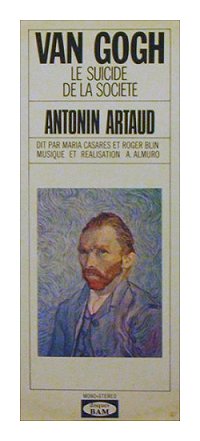
Publication:
Vincent Van Gogh-Antonin Artaud :
le suicidé de la société
Number of pages 192 , €39.00
EAN 9782370740038
Dimensions 34 x 25 cm
Publisher Skira Flammarion
Museum Musée d’Orsay
Language French
fleursdumal.nl magazine for art & literature
More in: Antonin Artaud, Art & Literature News, Artaud, Antonin, Suicide, Vincent van Gogh, Vincent van Gogh
The Sorrows of Young Werther (21) by J.W. von Goethe
JULY 18.  Wilhelm, what is the world to our hearts without love? What is a magic-lantern without light? You have but to kindle the flame within, and the brightest figures shine on the white wall; and, if love only show us fleeting shadows, we are yet happy, when, like mere children, we behold them, and are transported with the splendid phantoms. I have not been able to see Charlotte to-day. I was prevented by company from which I could not disengage myself. What was to be done? I sent my servant to her house, that I might at least see somebody to-day who had been near her. Oh, the impatience with which I waited for his return! the joy with which I welcomed him! I should certainly have caught him in my arms, and kissed him, if I had not been ashamed.
Wilhelm, what is the world to our hearts without love? What is a magic-lantern without light? You have but to kindle the flame within, and the brightest figures shine on the white wall; and, if love only show us fleeting shadows, we are yet happy, when, like mere children, we behold them, and are transported with the splendid phantoms. I have not been able to see Charlotte to-day. I was prevented by company from which I could not disengage myself. What was to be done? I sent my servant to her house, that I might at least see somebody to-day who had been near her. Oh, the impatience with which I waited for his return! the joy with which I welcomed him! I should certainly have caught him in my arms, and kissed him, if I had not been ashamed.
It is said that the Bonona stone, when placed in the sun, attracts the rays, and for a time appears luminous in the dark. So was it with me and this servant. The idea that Charlotte’s eyes had dwelt on his countenance, his cheek, his very apparel, endeared them all inestimably to me, so that at the moment I would not have parted from him for a thousand crowns. His presence made me so happy! Beware of laughing at me, Wilhelm. Can that be a delusion which makes us happy?
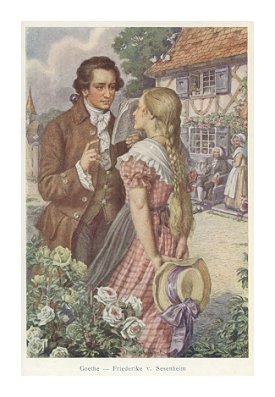
JULY 19. “I shall see her today!” I exclaim with delight, when I rise in the morning, and look out with gladness of heart at the bright, beautiful sun. “I shall see her today!” And then I have no further wish to form: all, all is included in that one thought.
The Sorrows of Young Werther (Die Leiden des jungen Werther) by J.W. von Goethe. Translated by R.D. Boylan.
To be continued
fleursdumal.nl magazine for art & literature
More in: -Die Leiden des jungen Werther, Goethe, Johann Wolfgang von
Tom Lanoye en het stuk der stukken: Shakespeares Hamlet ♦ Guy Cassiers, Tom Lanoye en het stuk der stukken: Shakespeares Hamlet. Cassiers regisseert deze bewerking met een grote cast, samengesteld uit de ensembles van Toneelhuis en Toneelgroep Amsterdam.  Het is de eerste coproductie in een reeks van vier, gepland tussen 2014 en 2016.
Het is de eerste coproductie in een reeks van vier, gepland tussen 2014 en 2016.
De oude koning is vermoord door zijn broer, Claudius. De geest van de dode koning roept zijn zoon, Hamlet, op tot wraak. Hamlet wordt verscheurd tussen zijn verlangen om de moordenaar te straffen en zijn liefde voor zijn overspelige moeder, die kort na de moord met Claudius hertrouwde. Zo begint de bekendste tragedie ter wereld.
Shakespeare schreef zijn Hamlet in tijden van grote politieke en sociale verwarring. Tom Lanoye schrijft een Hamlet voor de eenentwintigste eeuw, een tijd van niet minder grote politieke en sociale verwarring. Voor zijn bewerking duikt hij in de psychologie van de adolescentie. De ‘halfwas’ Hamlet, gespeeld door Abke Haring, voelt zich verpletterd door de wereld van de volwassenen. Zo ontstaat een personage dat weifelt tussen zelfhaat en zelfoverschatting, tussen minachting voor zichzelf en minachting voor de ‘onzuivere’ wereld die door oorlog verscheurd wordt.
De getormenteerde monologen van Hamlet zijn hartenkreet en uitdrijving, aanklacht en bezwering tegelijk. Hamlet raakt niet alleen verstrikt in de netten van de waanzin op zich, maar ook in de theatraliteit waarmee hij zichzelf ensceneert. Hij is een mens zoals wij allemaal: inconsequent, meerlagig, dubbelslachtig, ambigu. In het nastreven van zijn ambities en in het bestrijden van zijn angsten komt hij oog in oog te staan met zichzelf: Hamlet vs Hamlet.
Uit Hamlet vs Hamlet
‘Wat is het toch dat wat u van mij verlangt?
Waarom bezoekt u mij, op elk moment,
Op ieder uur, zo dag zo nacht, zo fel?
U maakt mijn leven zo tot gruwel dat
Ik, speelbal der natuur, verwrongen raak
Door hersenspinsels en begeertes die
Mij dreigen te vervreemden van elk mens.
Ik smeek u: spreek! Wat wilt u dat ik doe?
Wanneer, waartoe, met welk geweld — en hoe?’
CAST
Abke Haring: Hamlet
Chris Nietvelt: Gertrude
Eelco Smits: Laërtes
Gaite Jansen: Ophelia
Johan van Assche: Claudius, de geest van Hamlets vader
Katelijne Damen: de geest van Yorick
Kevin Janssens: Guildenstern, grafdelver, toneelspeler
Marc van Eeghem: Rozenkrantz, grafdelver, toneelspeler
Roeland Fernhout: Polonius
Guy Cassiers: ‘In de bewerking die Tom Lanoye van Hamlet maakt staat de groei naar de volwassenwording centraal. 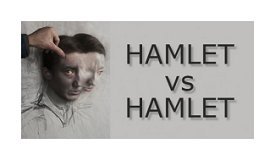 In dat proces speelt de verbeelding een belangrijke rol. Hamlet wordt door zijn eigen verbeelding tegelijk gestimuleerd en geïsoleerd. Uiteindelijk raakt hij verstrikt in zichzelf. Hij bevindt zich in het centrum van de macht, maar gedraagt zich toch als een buitenstaander. Dat is de kern van zijn identiteitscrisis: hij valt niet met zichzelf samen. Hij verbrokkelt in fragmenten. Voor Tom en voor mij is dat ook een metafoor voor de politieke crisis die Europa op dit ogenblik doormaakt: enerzijds is er de ambitie om deel uit te maken van een geglobaliseerde wereld, anderzijds groeit de angst om het overzicht te verliezen en wordt er opnieuw gezocht naar lokale identiteit en zekerheid. Hamlet blijft een Europees stuk bij uitstek.’
In dat proces speelt de verbeelding een belangrijke rol. Hamlet wordt door zijn eigen verbeelding tegelijk gestimuleerd en geïsoleerd. Uiteindelijk raakt hij verstrikt in zichzelf. Hij bevindt zich in het centrum van de macht, maar gedraagt zich toch als een buitenstaander. Dat is de kern van zijn identiteitscrisis: hij valt niet met zichzelf samen. Hij verbrokkelt in fragmenten. Voor Tom en voor mij is dat ook een metafoor voor de politieke crisis die Europa op dit ogenblik doormaakt: enerzijds is er de ambitie om deel uit te maken van een geglobaliseerde wereld, anderzijds groeit de angst om het overzicht te verliezen en wordt er opnieuw gezocht naar lokale identiteit en zekerheid. Hamlet blijft een Europees stuk bij uitstek.’
# Meer over de voorstellingen op de website van tga
fleursdumal.nl magazine
More in: Art & Literature News, Shakespeare, William, The talk of the town, THEATRE
 ZUIDELIJK TONEEL
ZUIDELIJK TONEEL
JULIUS CAESAR
kunnen woorden doden?
Regisseur Mirjam Koen ensceneert Julius Caesar van William Shakespeare, de eerste van zijn vijf grote tragedies. In een wereld vol list en bedrog navigeren Shakespeare’s personages tussen eigenbelang en landsbelang. Naast de acteurs speelt in iedere stad een lokale drumband mee. Met ritmische en opzwepende muziek zijn ze een medespeler in dit politieke drama over een continu gevoel van persoonlijke onveiligheid en oorlogsdreiging.
Julius Caesar dreigt van Rome een monarchie te maken, om zo de absolute macht in handen te krijgen. Een aantal senatoren vreest dat ze totaal worden buitengesloten van het dagelijks bestuur. Afgunst en jaloezie voeren de boventoon. Ze stellen elkaar en zichzelf gewetensvragen: kan ik doorleven zonder in te grijpen? Maar ieder woord, al is het gefluisterd, kan dodelijk zijn. Een complot wordt gesmeed om Caesar te doden en zo de republiek te redden. Brutus, de meest gerespecteerde en gewetensvolle politicus, zal echter aan hun kant moeten staan, zodat het volk niet in opstand komt. Want een onrustig volk is een gevaarlijk volk.
Shakespeare portretteert tijdloos en meeslepend een groep mensen die niet langer kan toekijken. Hij laat hun handelen zien en de consequenties hiervan. De taal is het wapen van degene die spreekt en retoriek viert hoogtij. Julius Caesar handelt over een tijdperk op drift. De angst regeert en dat maakt het volk rijp voor manipulatie en demagogie.
première 10 maart 2014, Theaters Tilburg
tournee 8 maart t/m 30 april 2014
tekst William Shakespeare
vertaling Tom Kleijn
bewerking Matthijs Rümke, Martine Manten
regie Mirjam Koen
spel Guy Clemens, Justus van Dillen, Cas Enklaar, Han Kerckhoffs, José Kuijpers, Saar Vandenberghe, Mattias Van de Vijver, Xander van Vledder, Abel de Vries (stage)
slagwerk Fiona Digney, Robin Eggers, Mei-Yi Lee, Julien Moussiegt, Marcel van Wensen, Che-sheng Wu
lokale drumbands: Tilburg, Turnhout – Koninklijke Harmonie Oefening en Uitspanning Goirle – Brugge – Koninklijke Harmonie De Verbroedering Beveren-Roeselare – Nijmegen – Drumfanfare Michaël, Slagwerkgroep Neerbosch-Oost, Jeugddrumfanfare De Stefaantjes – Leiden, Den Haag, Zoetermeer – Chr. Drum- en Showfanfare Door Vriendschap Sterk Katwijk – Eindhoven – Fanfare en Drumband St. Willibrordus Wintelre – Utrecht – Drumfanfare Jonathan Zeist Zwolle – Nooit Gedacht Windesheim – Meppel – Muziekvereniging Euphonia Nijeveen Haarlem, Amsterdam – Damiate Band Haarlem – ‘s-Hertogenbosch – Drumfanfare Amantius – Stadskanaal, Groningen – Muziekvereniging Crescendo Stadskanaal, leerlingen Muziekschool Zuid-Groningen – Almere – Drumfanfare Almere – Leeuwarden, Drachten – Pasveer Leeuwarden – Capelle aan den IJssel – Drumfanfare DKV – Heerlen – Drumband Marijke Hoensbroek Weert – Gouda – Muziekvereniging Kunst na de Arbeid Moordrecht – Arnhem – Harmonie St. Caecilia Doornenburg Hengelo – Drumfanfare Hengelo – Wageningen – Muziekvereniging OBK Bennekom Alkmaar – Slagwerkgroep Da Capo – Roosendaal, Tilburg, Breda – Harmonie en Tamboerkorps St. Cecilia Zegge – Rotterdam – Drumfanfare Excelsior Rotterdam
componist / muzikaal begeleider Rob Verdurmen
 dramaturgie Martine Manten
dramaturgie Martine Manten
decorontwerp Marc Warning
kostuumontwerp Arien de Vries
lichtontwerp Gé Wegman
kostuums Jolanda van de Ven, Jeanette van Vliet
regie-assistentie Koen van Hensbergen (stage),Tim Verbeek
kleedsters Jolanda van de Ven, Jeanette van Vliet, Kyra Wessel
techniek Stan Bannier, Leon Bartels, Paul Francot, Emile van Gils, Wilfried van der Grinten, Dick Huetink, Guido Langendoen, Peer van Sprang, Aron Zeijlmans (stage)
decorbouw Douwe Hibma
foto Cas Enklaar Milan Gies
fleursdumal.nl magazine for art & literature
More in: Shakespeare, William, THEATRE

The Sorrows of Young Werther (20)
by J.W. von Goethe
JULY 16.
How my heart beats when by accident I touch her finger, or my feet meet hers under the table! I draw back as if from a furnace; but a secret force impels me forward again, and my senses become disordered.
Her innocent, unconscious heart never knows what agony these little familiarities inflict upon me. Sometimes when we are talking she lays her hand upon mine, and in the eagerness of conversation comes closer to me, and her balmy breath reaches my lips,–when I feel as if lightning had struck me, and that I could sink into the earth. And yet, Wilhelm, with all this heavenly confidence,–if I know myself, and should ever dare–you understand me. No, no! my heart is not so corrupt, it is weak, weak enough but is not that a degree of corruption?
She is to me a sacred being. All passion is still in her presence: I cannot express my sensations when I am near her. I feel as if my soul beat in every nerve of my body. There is a melody which she plays on the piano with angelic skill,–so simple is it, and yet so spiritual! It is her favourite air; and, when she plays the first note, all pain, care, and sorrow disappear from me in a moment.
I believe every word that is said of the magic of ancient music. How her simple song enchants me! Sometimes, when I am ready to commit suicide, she sings that air; and instantly the gloom and madness which hung over me are dispersed, and I breathe freely again.
The Sorrows of Young Werther (Die Leiden des jungen Werther) by J.W. von Goethe. Translated by R.D. Boylan.
To be continued
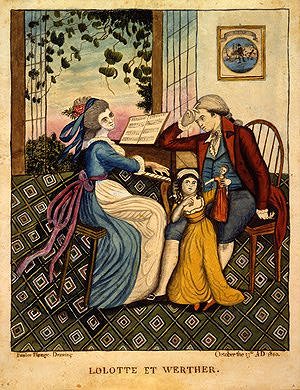
fleursdumal.nl magazine for art & literature
More in: -Die Leiden des jungen Werther, Goethe, Johann Wolfgang von
![]()
William Butler Yeats
(1865-1939)
A Coat
I made my song a coat
Covered with embroideries
Out of old mythologies
From heel to throat;
But he fools caught it,
Wore it in the world’s eyes
As though they’d wrought it.
Song, let them take it,
For there’s more enterprise
In walking naked.
Who comes at need, although not now as once
A clear articulation in the air,
But inwardly, surmise companions
Beyond the fling of the dull ass’s hoof
— Ben Jonson’s phrase — and find when June is come
At Kyle-na-no under that ancient roof
A sterner conscience and a friendlier home,
I can forgive even that wrong of wrongs,
Those undreamt accidents that have made me
— Seeing that Fame has perished this long while.
Being but a part of ancient ceremony —
Notorious, till all my priceless things
Are but a post the passing dogs defile.
William Butler Yeats poetry
fleursdumal.nl magazine
More in: Archive Y-Z, Yeats, William Butler

The Sorrows of Young Werther (19)
by J.W. von Goethe
JULY 13.
No, I am not deceived. In her dark eyes I read a genuine interest in me and in my fortunes. Yes, I feel it; and I may believe my own heart which tells me–dare I say it?–dare I pronounce the divine words?–that she loves me!
That she loves me! How the idea exalts me in my own eyes! And, as you can understand my feelings, I may say to you, how I honour myself since she loves me!
Is this presumption, or is it a consciousness of the truth? I do not know a man able to supplant me in the heart of Charlotte; and yet when she speaks of her betrothed with so much warmth and affection, I feel like the soldier who has been stripped of his honours and titles, and deprived of his sword.
The Sorrows of Young Werther (Die Leiden des jungen Werther) by J.W. von Goethe. Translated by R.D. Boylan.
To be continued
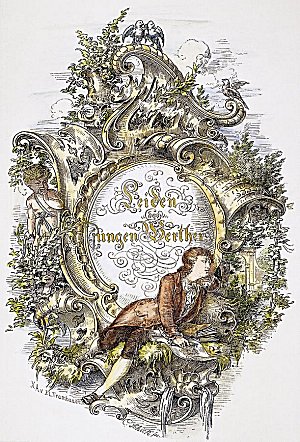
fleursdumal.nl magazine for art & literature
More in: -Die Leiden des jungen Werther, Goethe, Johann Wolfgang von

Rob Stuart: Pregnant Pause
fleursdumal.nl magazine
More in: *Concrete + Visual Poetry P-T, Rob Stuart, Rob Stuart, Stuart, Rob
Thank you for reading Fleurs du Mal - magazine for art & literature